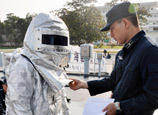
Ho said her school is also developing courses to include Chinese culture such as preparing tea and calligraphy.
"We want our students to be mindful that Chinese culture is the most elegant culture," she said. "All those values are deeply rooted in Chinese culture."
Ho's student Jiang said learning Western etiquette shows respect for people around her. "Many people talk about Chinese misbehavior. But if you start behaving yourself, other people will not feel easy being rude to you," she said.
Butler service
When Christopher Clark opened the Ritz-Carlton in Sanya, in South China's Hainan province, he selected 12 people to form the first butler team in the country's most famous island resort.
The Chinese butlers learned how to serve tea, how to pack a suitcase and how to handle bookings for guests staying at their luxury villas and executive lounges.
Guests, including chief executive officers and senior business professionals, like such personal attention. "A butler is your personal assistant in the hotel and forms a relationship with guests," said Clark, who is to be the general manager of The Ritz-Carlton in Chengdu, which will open this summer.
The nature of butler service is understanding and trust, said Clark. "In a room with a lot of tension, you have to be intuitive and think for the guests," he added. "It is about being available when the guests want you there and not being there when they want privacy."
The craftsmanship of a butler lies beyond skill and experience. "We are looking for the attitude of an individual," he said. "We can teach them skills through training, but can they think? Can they anticipate? Are they confident enough? These are to do with their attitude."
The increasing number of wealthy Chinese traveling abroad has broadened their minds to Western types of service. They appreciate they can find the same level of experience in their hometowns now, Clark said.


















 Fine and fresh, Shanghai takes a bite of Diaoyu Islands
Fine and fresh, Shanghai takes a bite of Diaoyu Islands


![]()
